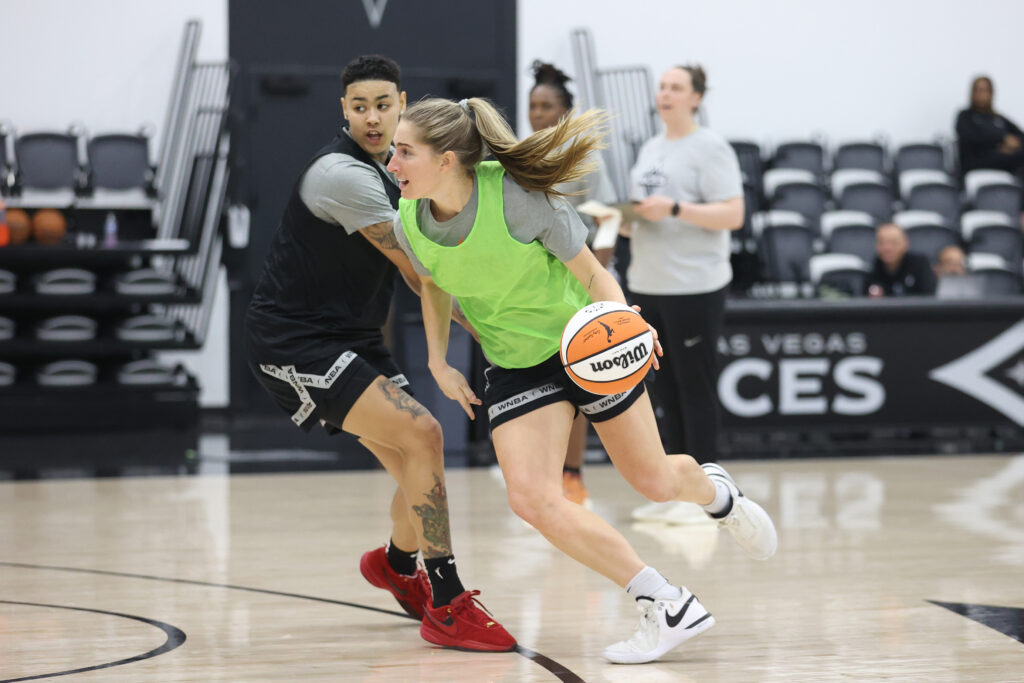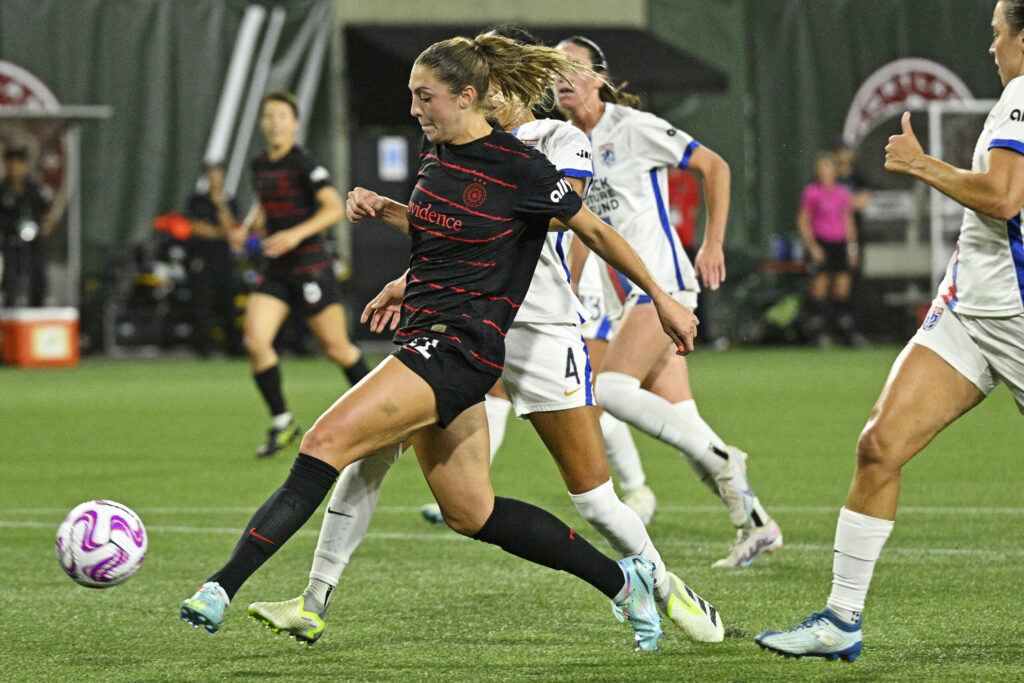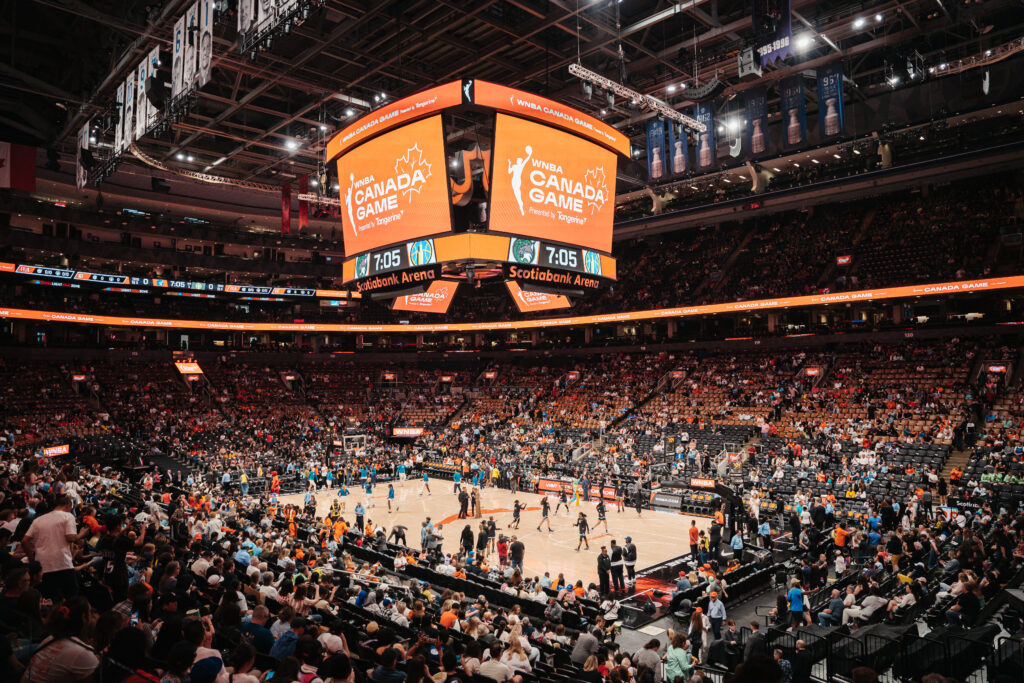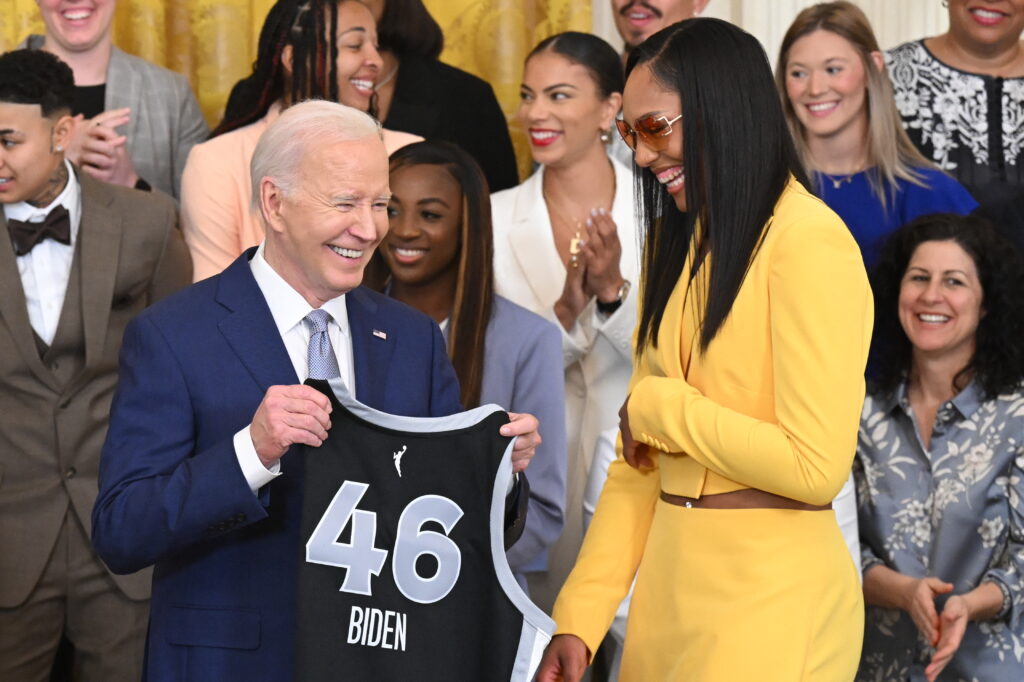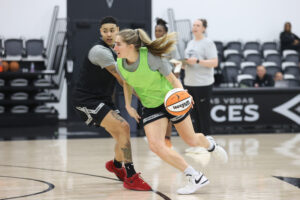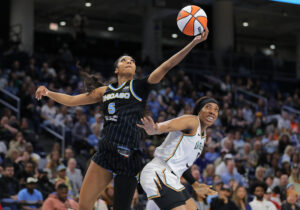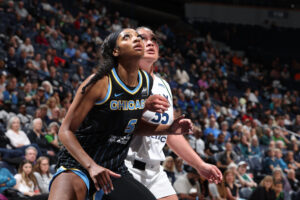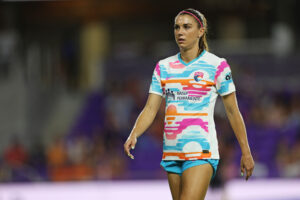At the end of last season, Napheesa Collier was in Uncasville, Conn., trying to help the Lynx secure a playoff spot. She had given birth to her daughter, Mila, less than three months prior.
There were no expectations for Collier to be back on the court. Even she knew it was a little bit crazy. But Collier wasn’t doing it for herself — she was doing it for Sylvia Fowles, who was playing in her last regular season game before retirement. Collier wanted to be there for the teammate who had been there for so much of her early career.
So, on Aug. 14, 2022, Collier played in her fourth and final game of the season. She had given birth on May 25, and tiny Mila was in attendance in the arms of Collier’s mom, as visual proof of just how quickly she returned to the court.
That game marked the start of a new chapter for Collier in a lot of ways. The Lynx lost and didn’t make the playoffs, but it was still a special moment. They celebrated Fowles, a two-time WNBA champion and one of the foundational players of the Lynx’s dynasty of the past decade, and she passed the baton onto Collier. The new face of the Minnesota Lynx.
A year and a month later, Collier was back in Connecticut, sitting on the podium addressing media members after her team’s 90-60 blowout loss in Game 1 of their first-round playoff series against the Sun. Unlike when she returned to play with Fowles, there were expectations. A lot of them.
But Collier was ready for those expectations the moment she assumed her role as Minnesota’s veteran leader. This season, after the Lynx started 0-6, they battled their way to the playoffs, largely thanks to Collier, who enjoyed a career-best season while averaging 21.5 points, 8.5 rebounds, 2.5 assists and 1.6 steals per game. On Sunday, Collier helped the Lynx stave off elimination with an 82-75 win over the No. 3 Sun, before falling in the deciding game in Minnesota on Wednesday night, 90-75.
“I knew that Phee was going to be pivotal to our ability to find success, and maybe in a season that people didn’t necessarily think that we could find success,” coach Cheryl Reeve said. “She’s probably exceeded the expectations.”
And with expectations comes accountability.
Last week, Collier answered questions, dejected but determined. In the locker room, following a loss in which Collier recorded 14 points, six rebounds and two blocks, Reeve said her 26-year-old star was the most upset out of anyone.
“I’m disappointed in myself, obviously not how I want to come out for our first playoff game,” Collier said. “So I just have to learn from it and do better next game. That’s the beauty about a series is that we get another crack at it.”
It’s not that Collier didn’t have the ability to answer questions like that before. In fact, Reeve named her a captain during her second season in the WNBA. But there was always someone with more experience and, in turn, more accolades that the team would look to when things got tough. During her first season, it was Seimone Augustus; for every year after that, it was Fowles. Now and into the future, it’s Collier’s responsibility.
In Games 2 and 3 of the series against Connecticut, Collier answered her own charge, doing everything she could to try to force the upset. On Wednesday night, she set a new playoff career mark with 31 points on 11-for-19 shooting despite being double- and sometimes triple-teamed. After the game, Sun coach Stephanie White said Collier would be a WNBA MVP one day, and Reeve praised the forward for putting “the team on her back repeatedly this season.”
can't stop that fadeaway 😮💨 pic.twitter.com/uqF8qJGs81
— Minnesota Lynx (@minnesotalynx) September 21, 2023
“(Reeve) saw me as our next franchise player, which obviously I’m so honored to be that,” Collier said. “They were trying to prepare me early for that role and putting me in positions to grow as a leader.”
Minnesota’s No. 2 draft pick, rookie Diamond Miller, was in a similar position this year. Playing in her first WNBA playoffs, the rookie said she sought advice from Collier before taking on Connecticut in Game 1 last week.
Miller played in plenty of postseason games at Maryland, but the WNBA playoffs, Collier told her, are a whole different level of basketball. She encouraged Miller to enjoy the moment and not let it get too big.
Collier tried to create a locker room culture like the one she came into as a rookie, averaging 13.1 points and 6.6 rebounds per game on her way to being named 2019 Rookie of the Year. One where players like Miller and Minnesota’s other rookie, Dorka Juhász, felt comfortable.
“I’ve just tried to tell them that not everything is a life-or-death situation, because as rookies, I feel like they can’t put it into perspective,” Collier said. “You have a bad game, but that doesn’t mean you’re a bad player.”
Her Rookie of the Year season was just four seasons ago, but for Collier, it feels like much longer. At that point, she was fresh out of college, in a lot of ways feeling like a kid herself. This year, she was packing a diaper bag between games for her 1-year-old daughter.

Being a mother changed her in ways Collier didn’t necessarily expect. Everything she does on the court as a player and a leader was always inside of her, but Mila has made her different off the court. Now, Collier is more vocal for causes she cares about, both inside and outside of the WNBA.
One of those causes is the way the WNBA treats moms.
A month ago, Skylar Diggins-Smith revealed on social media that she wasn’t allowed to use the Phoenix Mercury’s facilities while away on maternity leave. Earlier in the season, the Las Vegas Aces came under scrutiny after Dearica Hamby accused them of trading her because she was pregnant.
Under the current CBA, teams are required pay players on maternity leave their full salaries, the value of which still counts against the salary cap. That’s a rule Collier wants to see change.
“My salary hurts the team if I’m not playing,” she said. “So, in the future it’s really plausible to see people getting kicked off teams — that’s what Dearica accused Vegas of. It’s plausible that teams won’t want to hire players in relationships, or who have spoken about wanting kids because it’s going to come off the cap. So, making sure that that doesn’t happen in our next CBA, I think is really important.”
The league also offers monthly stipends to help with childcare, but Collier would like to see that increase in the future.
“I think we’ve made huge strides,” Collier said of the current CBA, which was ratified in 2020 during Cathy Engelbert’s first year as WNBA Commissioner. “It’s kind of like buying your first house. It’s amazing, but it shows you everything you like about it and everything that needs to change.”
Collier is becoming more vocal about issues outside of the WNBA as well. In the future, she wants to get more involved in gun safety causes, something she thinks about every time she and Mila leave the house.
Mila is only 1, but her safety at school is already at the forefront of Collier’s mind.
“It’s just so heartbreaking that it feels like people in power don’t care how many children die from this,” she said. “It’s the number one cause of death in kids in the United States. It’s just insane and mind-boggling. So, it’s definitely something that I want to get more involved in and just kind of use my platform for any way that I can help make change.”
Mila also inspired the creation of Unrivaled, a 3×3 league that Collier is launching with fellow UConn graduate Breanna Stewart.
The idea came from a discussion Collier had at the dining room table with her husband, basketball skills coach Alex Bazzell. He brought up the possibility of forming another league, and Collier ran with it. Getting Stewart involved was only natural, and from conception to launch, Unrivaled came to fruition in a matter of months.
The 3×3 league, which will run during the WNBA offseason from January to March, will feature 30 players and provide them with another opportunity to play professionally without going overseas. Players’ salaries for the 10-week season are expected to be competitive with top WNBA and overseas salaries. The league will officially launch in 2025, Collier said Thursday, and be based in Miami.

Collier liked the idea for Unrivaled both because of the WNBA’s prioritization rule and because of her family. She’s no longer in a place in her life where going to a different country for a few months every year is plausible or desirable. She’s always been a homebody, but now with Mila, it’s more of a priority to stay home. Plus, she wants to help create opportunities for her peers, while also capitalizing on the rising interest in women’s sports.
“This is not a passing (fad),” Collier said of the recent momentum behind women’s sports and the WNBA, which just recorded its most-watched regular season in 2021 years and the highest average attendance for a season since 2018.
“And we want to be able to make money off that too, and monetize the hard work that we’re putting in and what we think is a great product. So that’s why we’re really excited that all the players are going to have equity in it. We’re really excited about the salary that we’re going to be offering. I’m really hoping to make a difference in our sport.”
She also hopes that difference leads to even more growth for women in sports, of course with Mila in mind.
Collier, 26, always liked the idea of being a young mom in the league. She looks up to the bond that Candace Parker has with her daughter Lailaa, who was born early in Parker’s WNBA career.
“I don’t want her to just hear these stories about me,” Collier said of her daughter. “I want her to grow up experiencing them.”
And she hopes Mila looks back on those experiences with pride.
“I just want to be a good role model for her in every aspect of life,” Collier said.

